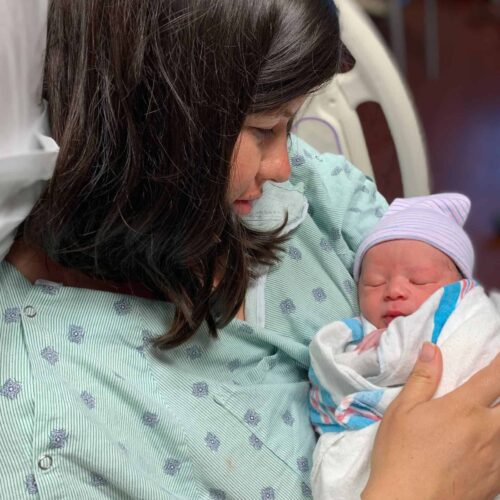Introduction
There’s a long list of things pregnant people are taught to avoid: soft cheeses, cat feces, sushi.
So perhaps it’s no surprise so many expectant mothers are wary of a new vaccine: Only 34% of pregnant women are vaccinated against COVID-19, according to estimates from the Centers for Disease Control and Prevention, even as nearly 70% of the general population has received a covid shot.
But now, experts say, that needs to change.
When I wrote about my decision to get vaccinated while pregnant in April, the choice was still a hard one for many. Pregnant women had not been included in clinical trials for the vaccine, as they are almost always excluded from new drug trials. And, while waiting to amass safety data, health organizations such as the CDC recommended only that pregnant women be given the option to take it.
But since then, the safety data on vaccines and pregnancy has continued to pile up. And experts’ calls for pregnant women to get the shot have grown louder and louder. In August, the CDC urged expectant mothers to get the vaccine as soon as possible.
That’s because all the studies and data “have demonstrated repeatedly that the vaccine is safe and effective, has no harm to the pregnant woman herself, has no concerns for the fetus,” said Dr. Geeta Swamy, a professor of obstetrics and gynecology at Duke University. “There is no reason to delay.”
Hundreds of thousands of pregnant women in the U.S. have now been safely vaccinated against COVID-19. Studies have found that vaccinated women had similar miscarriage rates as unvaccinated women. And scientists have found that vaccines are working for pregnant women: Early reports show that vaccinated mothers have a lower risk of coronavirus infection as well as covid antibodies in their umbilical cords and breastmilk. This means mothers are more likely to provide some protection to newborns.
There’s another reason experts’ pleas to the public have grown more urgent: the ferocity of the delta variant. Pregnant women who get infected are more likely to die or give birth too early. Twenty-one pregnant women died in August alone from COVID-19, the CDC said.
“It is horrifying to watch these young, healthy women not be able to breathe and their babies lose oxygen levels,” said Dr. Linda Eckert, a professor of obstetrics and gynecology at the University of Washington. “If people want to have fear, they should have fear of that and not of the vaccine.”
Obstetricians know the threat has real-life consequences.
“It’s simply devastating to watch a family take a baby home without the mother when you know it could have been prevented,” said Swamy, noting that nearly every physician working in a major medical center has now witnessed a pregnant patient die of COVID-19.
Eckert said patients often bring up concerns about future infertility — fueled by online misinformation — as a reason they would not get the shot. Her typical response is two-fold. First, she tells them that naysayers have warned about infertility for every vaccine since the polio vaccine and then, she tries to answer specific concerns.
“There’s just a lot of unfounded fears,” Eckert said. “We have a really good understanding of how the vaccine works. We have a really good understanding of what happens to the components of the vaccine.”
Major medical organizations, including the American Academy of Pediatrics and the American Society for Reproductive Medicine — which represents fertility doctors — have all recommended that prospective parents take the vaccine.
Swamy urges those hesitant to get it to talk to trusted vaccinated friends or doctors about their choice. She said she often hears the unvaccinated say they have done their own research, and she pushes back. “What does that word ‘research’ mean? Because in our world, research means systematic investigation to answer a scientific question,” she said. “It doesn’t mean reading about it.”
Given the current mountain of safety data and how bad the delta variant has turned out to be, I’m confident I made the right choice to get the shot. And as far as I know, I’ve avoided COVID-19 infection. My baby, born earlier this summer, is happy and healthy. I’m glad to be doing my part to reduce transmission in my community.
I’m also glad to no longer be giving a second thought to cats or sushi.
Liz Essley Whyte is a reporter at the Center for Public Integrity. She can be reached at [email protected]. Follow her on Twitter at @l_e_whyte.
Help support this work
Public Integrity doesn’t have paywalls and doesn’t accept advertising so that our investigative reporting can have the widest possible impact on addressing inequality in the U.S. Our work is possible thanks to support from people like you. Donate now.
Read more in Health
Coronavirus and Inequality
Six lessons from the Paycheck Protection Program
The pandemic aid for small businesses exposed many of the cracks in an unequal system. Midstream fixes helped show some ways to reach people more equitably in a crisis, but changes came late.
Coronavirus and Inequality
Once again, some states are choosing who gets COVID-19 care
After Public Integrity showed that emergency plans allowed rationing care to people with disabilities, health experts debate who should be at the front of the line.





Join the conversation
Show Comments